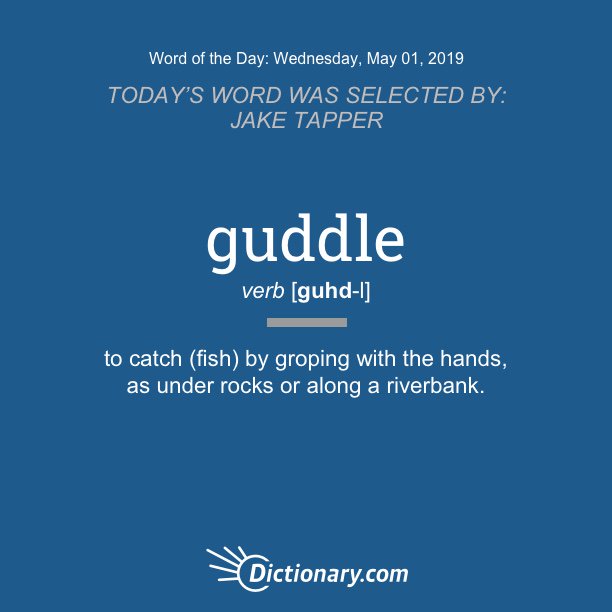

The Most Surprisingly Serendipitous Words Of The Day
We’re back celebrating our Word of the Day’s birthday! Because there’s plenty left to reminisce about from the last 10 years.
In Part II of our lexical stroll down memory lane (see Part I, 1999–2008, here), we will be examining word selections from 2009–2018, unearthing serendipitous synchronicities and offering perspicacious perspectives into notable events and trends of the last decade.
Oops, just kidding, because our first call out is actually from this year. In tribute to all you bibliophages, we asked some of our favorite authors to select words throughout our birthday month. Like host of CNN’s The Lead and author of The Outpost and The Hellfire Club Jake Tapper, who chose the first birthday-month word, guddle.
And then came bestselling author of Bad Feminist and Hunger Roxane Gay, who chose the seasonally appropriate word blossom the following week. Award-winning author of Speak and Shout (to name a few) Laurie Halse Anderson chose next, picking the word consent on the third Wednesday of the month to raise awareness around consent-based sexual relations.
Stay tuned for more author picks as the logophilic festivities continue. Now, on to those serendipitous words!
cormorant
“a greedy person.”
– March 16, 2009
– March 16, 2009
A cormorant is a type of water bird. But, thanks to its perceived voraciousness, the cormorant can represent gluttony and greed in literature, figured as Satan in Milton’s Paradise Lost and maligned in Shakespeare’s Love’s Labour’s Lost.
We featured this word on March 16, 2009, the date when President Obama expressed outrage at the insurance company AIG giving bonuses to its top executives from taxpayer bailout money, and said he would do everything in his power to stop it. “This is a corporation that finds itself in financial distress due to recklessness and greed,” he said.
suspire
“to sigh; utter with long, sighing breaths.”
– May 22, 2010
– May 22, 2010
We’re pretty sure nobody has this date marked on their calendar as one to remember from the last decade. But, May 22, 2010 was the day Nicolaus Copernicus—the 16th century Polish astronomer who proposed the heliocentric theory of our planetary system, which the Catholic Church came to condemn—was reburied as a hero. Ah, sweet vindication.
We imagine Copernicus somewhere in the great beyond suspiring with an eye-roll … “Finally.”
scurrilous
“grossly or obscenely abusive.”
– April 17, 2011
– April 17, 2011
The word scurrilous is most often used to describe remarks that are vulgar and injurious, as in “He was the victim of scurrilous attacks.” It ultimately comes from Latin scurra meaning “buffoon.” Eighteenth-century lexicographer Samuel Johnson made the connection plain in his definition: “using such language as only the licence [sic] of a buffoon can warrant.”
The word is also used to describe demeanor, as in “the scurrilous imposter.” We wonder if Word of the Day fans found it useful back in April 2011 for talking about a certain, shall we say, graphic new series called Game of Thrones, which premiered the day this word was featured. Winter is coming.
terpsichorean
“pertaining to dancing.”
– November 18, 2012
– November 18, 2012
The year 2012 does not have a monopoly on dancing (you can dance if you want to), but the timing of this word selection brings a smile as it was featured right around the time the South Korean superstar Psy had transfixed viewers with his so-called invisible-horse dance in the megahit “Gangnam Style.”
By November of 2012, “Gangnam Style” was well on its way to a billion views on YouTube (a milestone that was hit a month later). Today “Gangnam Style” has more than 3.3 billion views and counting, and we’re still trying to master his equestrian terpsichorean style.
logomachy
“a dispute about or concerning words.”– May 7, 2013
Although it may feel like heated disputes about words and their meanings are a new phenomenon (hi, Twitter), we assure you, lexical quibbles are as old as English itself, or at least as old as Early Modern English, when this word choice entered the lexicon (first attested in 1569).
2013 was the year that the word twerk bounced into the spotlight—with a little “help” from Miley Cyrus—and sparked many a debate about its origins and staying power. And, of course, that meant twerk was added to Dictionary.com in 2013 as well (along with a few others that tend to spark logomachies, including selfie, mansplain, and cronut).
meliorism
“the doctrine that the world tends to become better or may be made better by human effort.”– May 28, 2014
Rooted in the Latin melior, meaning “better,” meliorism came in the middle of a year defined by Black Lives Matter and its campaign for the equality of black people and against the violence they face.
The movement might be considered a powerful example of meliorism. Whether in protests on the streets or through hashtags on social media, its activism seeks to make the world a better place for the marginalized.
e pluribus unum
“out of many, one.”– July 4, 2015
This unofficial motto of the US, meaning “out of many, one” in Latin and featured on our Great Seal and currency, dates back to the early days of the country, when the original 13 colonies united into a single nation.
Since then, e pluribus unum has evolved to express an idea of American unity in diversity. That belief rang a lot truer for many people when we featured this expression on Independence Day 2015. Just over a week before, the Supreme Court issued a landmark ruling that same-sex marriage is a legal right from sea to shining sea.
suffrage
“the right to vote, especially in a political election.”– November 8, 2016
Perhaps you’ve noticed a theme as we’ve moved into the mid-2010s. Politics, identity, and language. Increasingly in the news, culture, and social media environment of the 2010s, Word of the Day has become a lens for many users, a way of looking at or reflecting on the affairs of the day.
Like suffrage, which we featured on Election Day 2016, marked by the election of Donald Trump to the White House. What did y’all see in this word choice? Is it any different now?
multitudinous
“existing, occurring, or present in great numbers; very numerous.”– January 21, 2017
The day after the inauguration of Donald Trump met the Women’s March, where over 200,000 people gathered in the nation’s capital—and many millions more across the US and world—in protests for the rights of women and other oppressed groups.
Considered the largest single-day protest in the US, the Women’s March can truly be described as multitudinous, or “very numerous,” the adjective form of multitude.
Minerva
“a woman of great wisdom.”– March 8, 2018
Speaking of women’s rights, March 8 is International Women’s Day, an apt occasion for Minerva. This word for a wise woman takes up the mantle of the Roman goddess of wisdom and the arts, Minerva, an analog to Athena of ancient Greece.
Minerva is also the namesake of Minerva McGonagall, who became Headmistress of Hogwarts in the Harry Potter universe.
Minerva = A woman of great wisdom.
Also Minerva = Headmistress of Hogwarts. #InternationalWomensDay #WordOfTheDayhttp://www.dictionary.com/wordoftheday/2018/03/08/minerva …
No matter how far the technology has come since the antediluvian dial-up days of 1999, the appetite—the appetence, edacity, the maw—for Word of the Day remains Brobdingnagian.
Plus, there’s all of you. The real birthday present has been hearing from our readers, who are sharing your favorite Word of the Day selections with us on social media. Your reactions to Word of the Day make it truly great.
Thanks for 20 years, and we look forward to many more. We certainly think they’ve made us … all the wiser.



